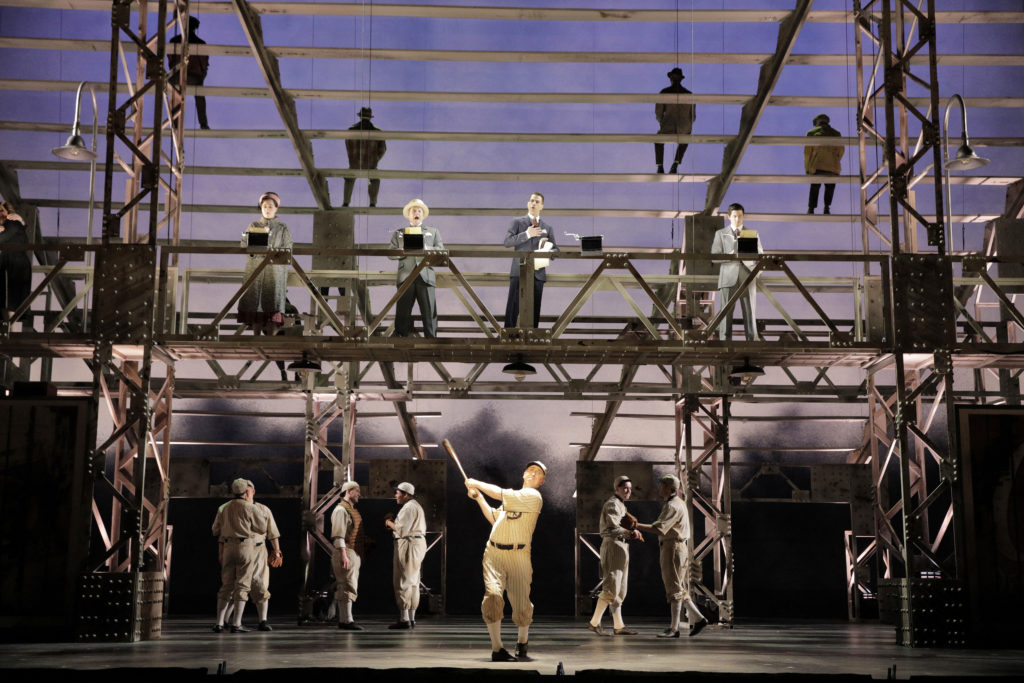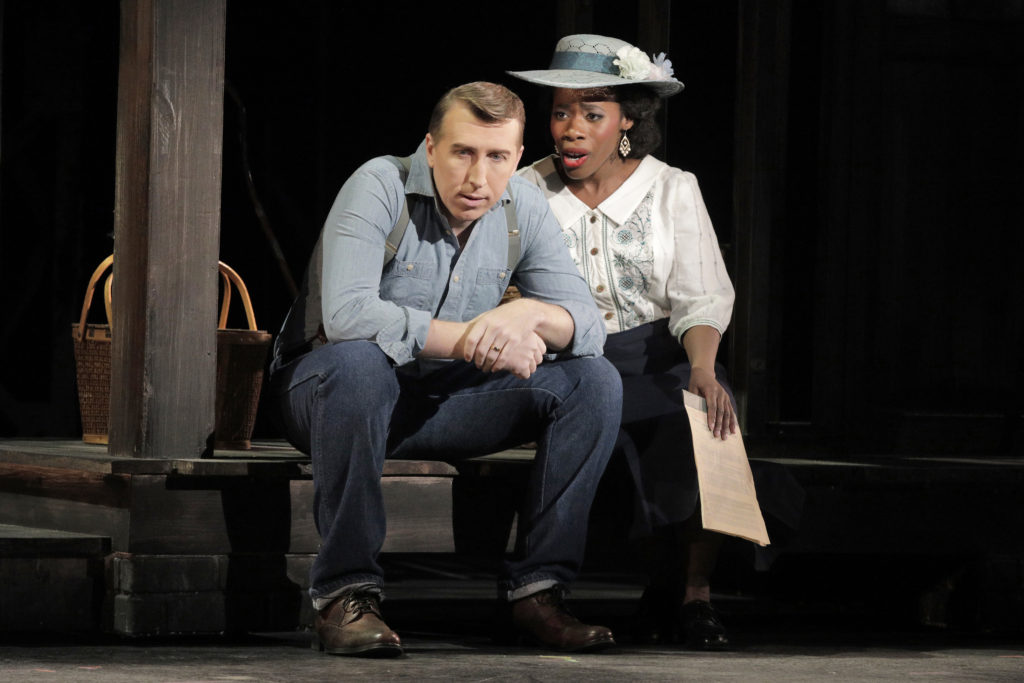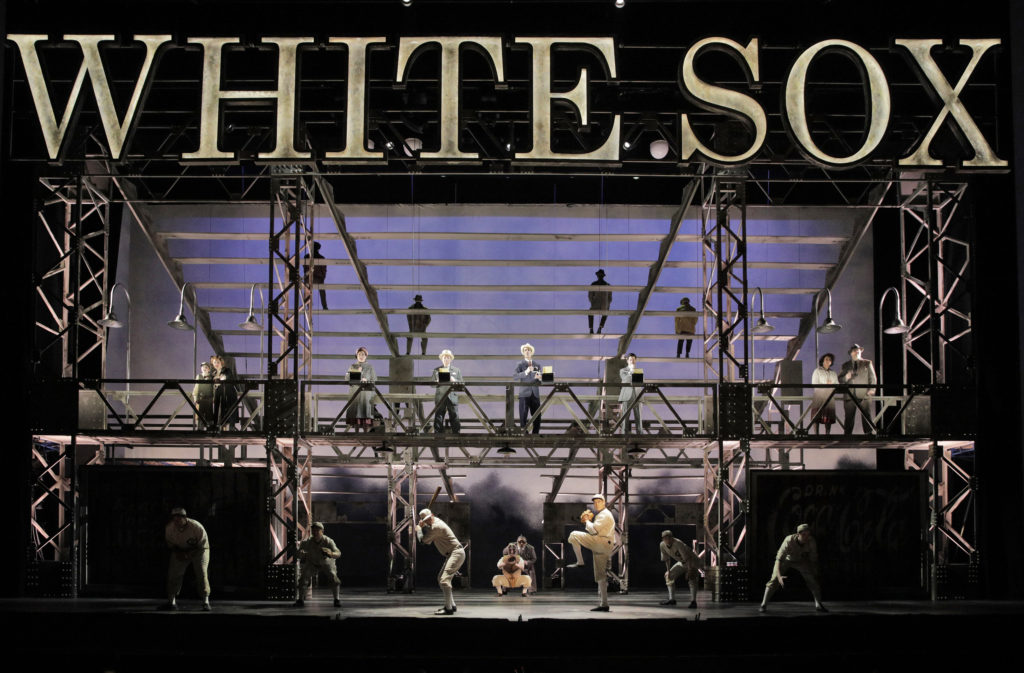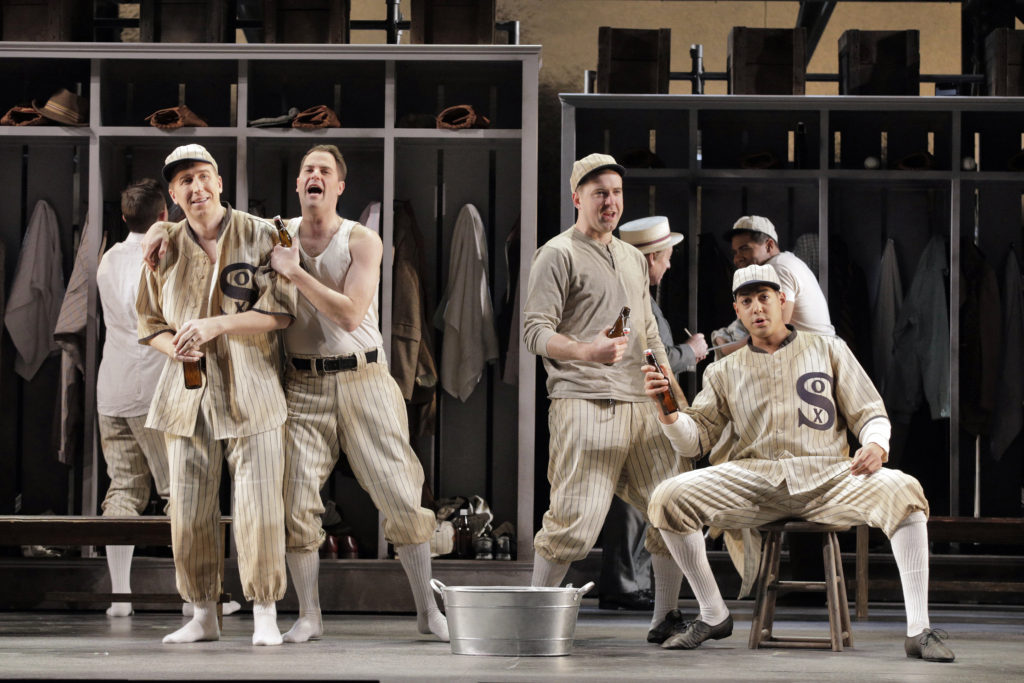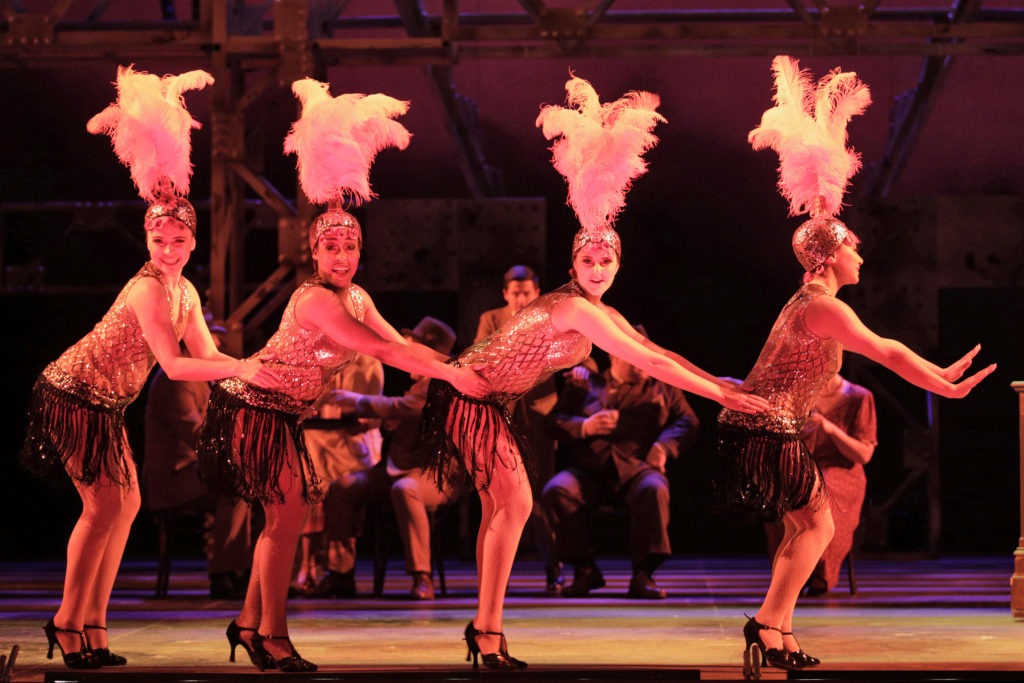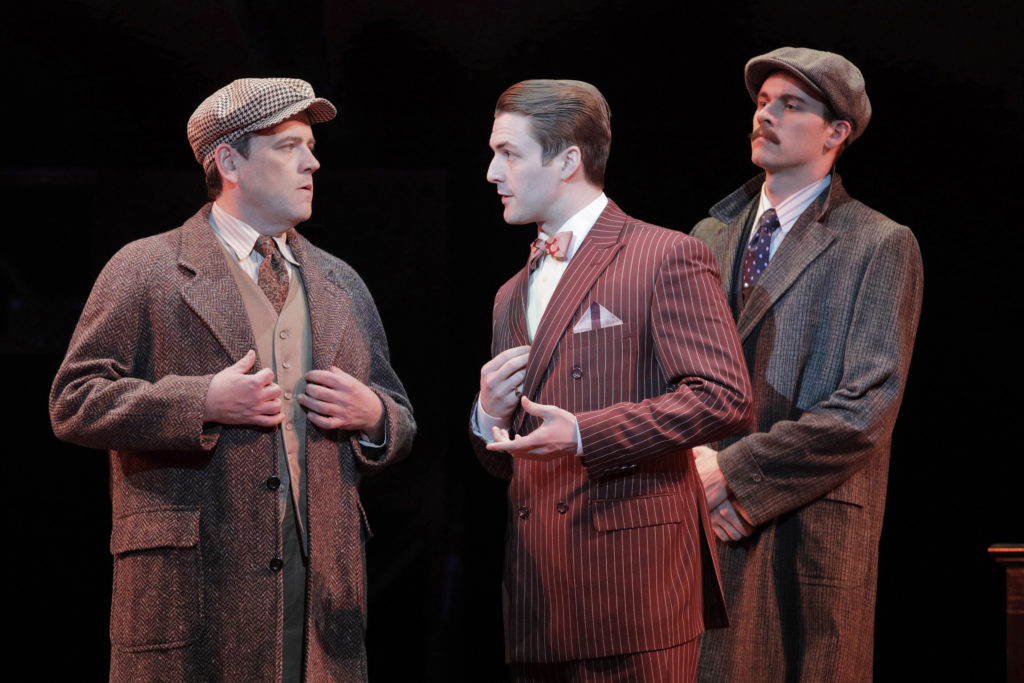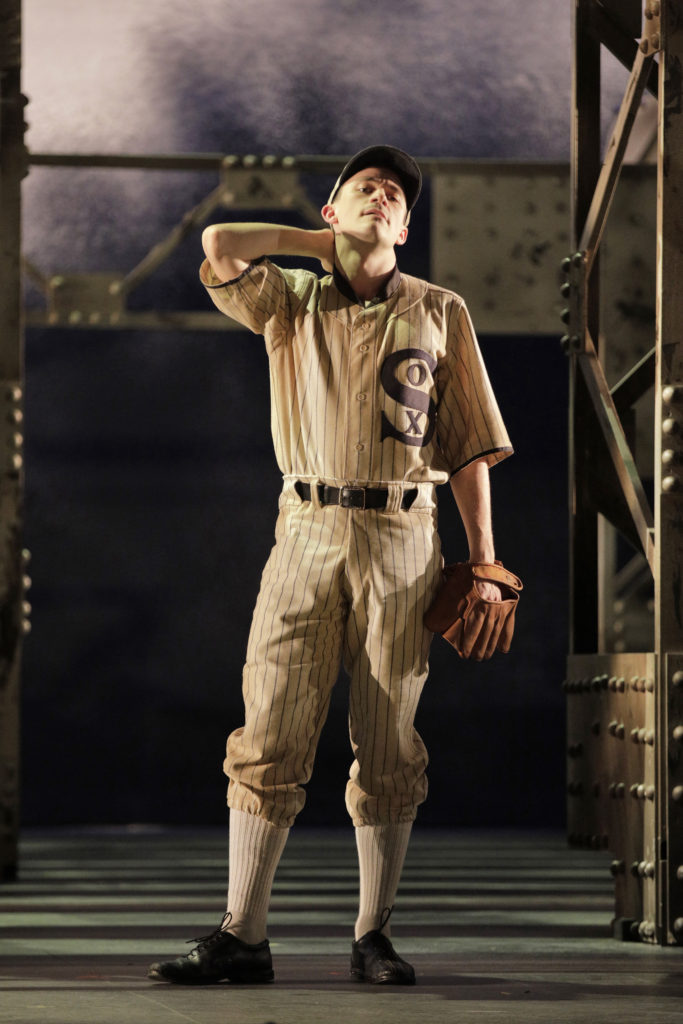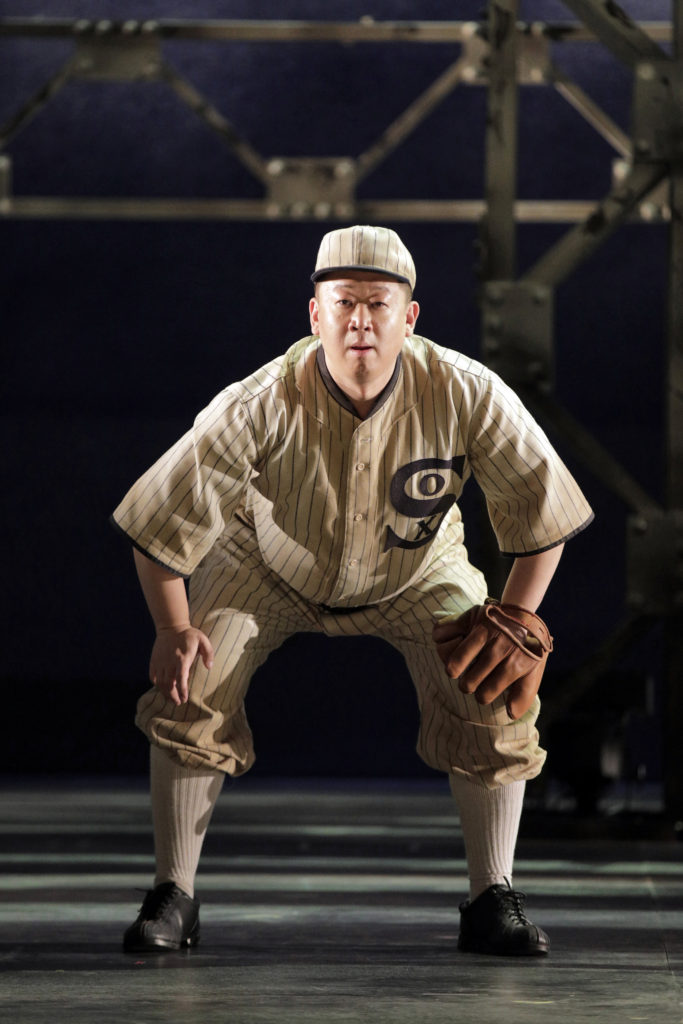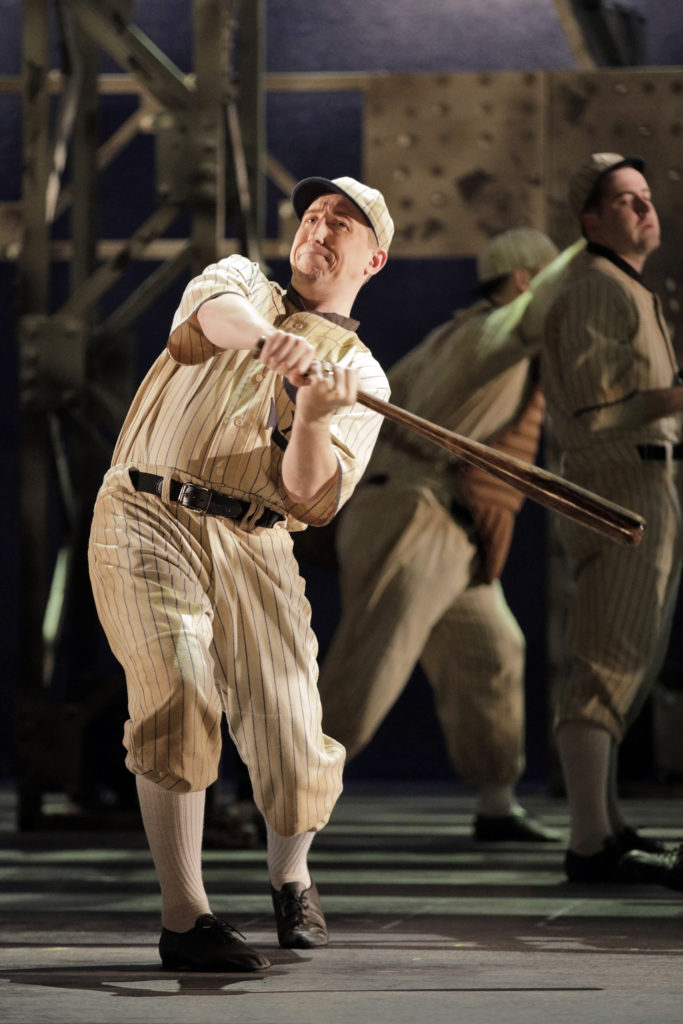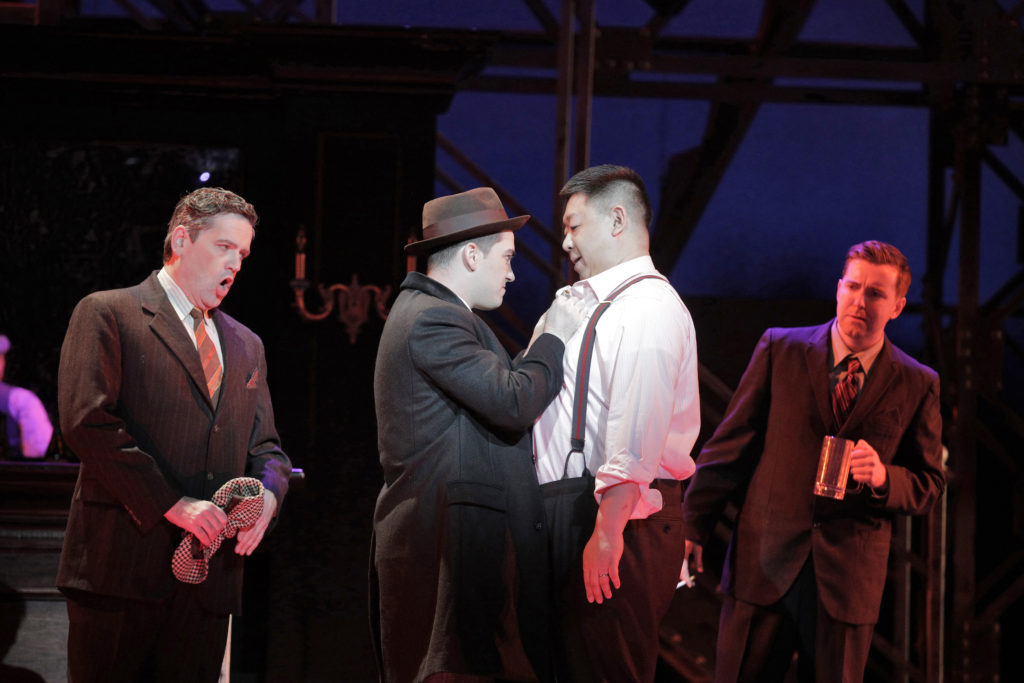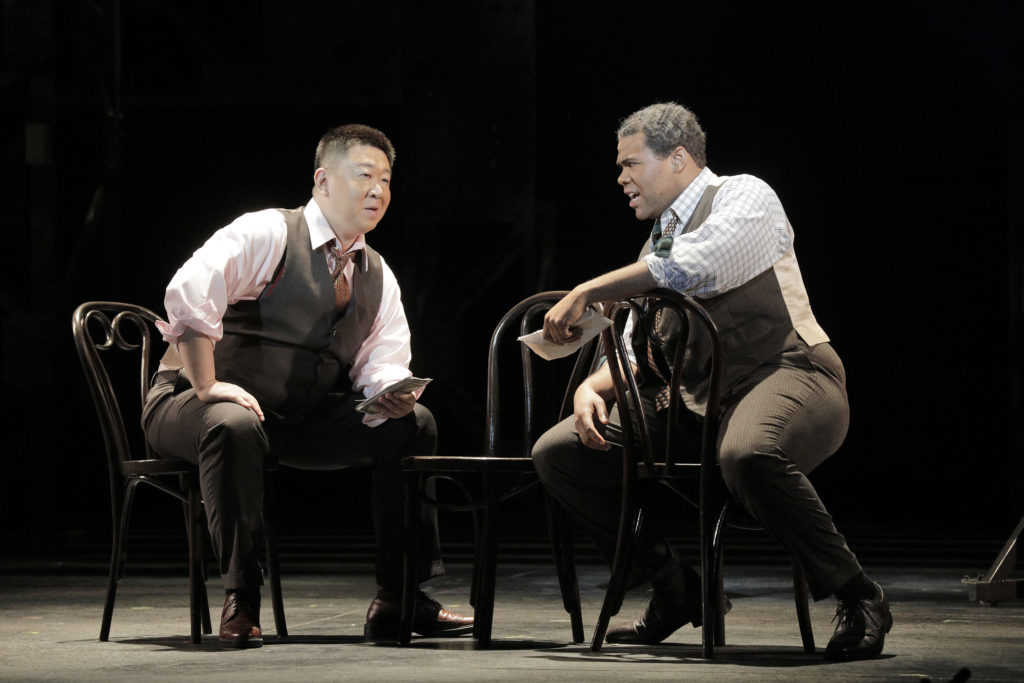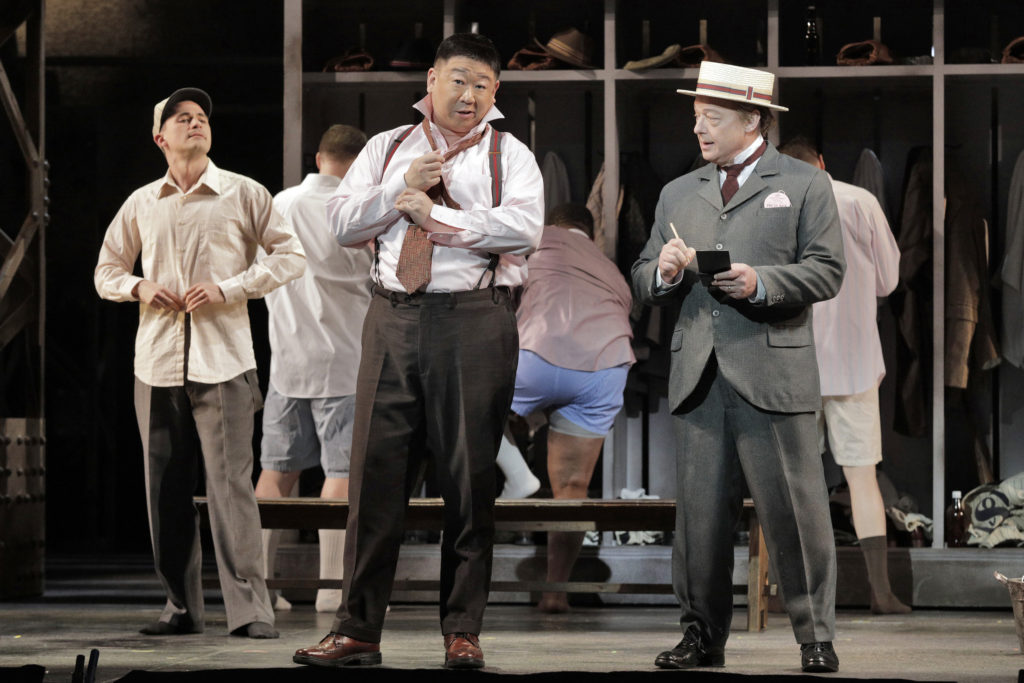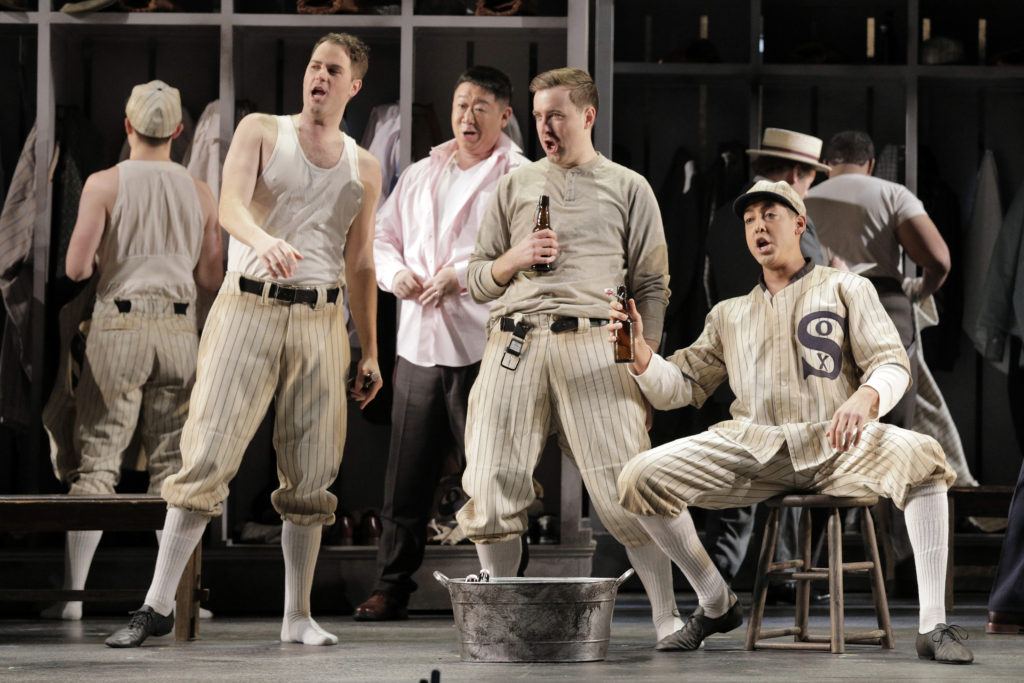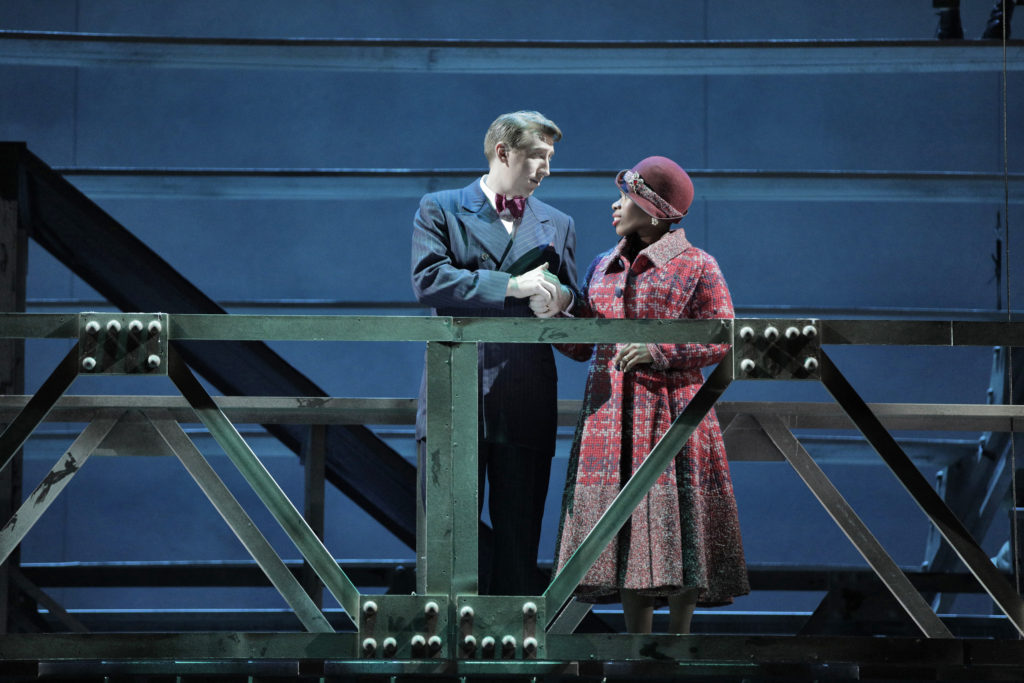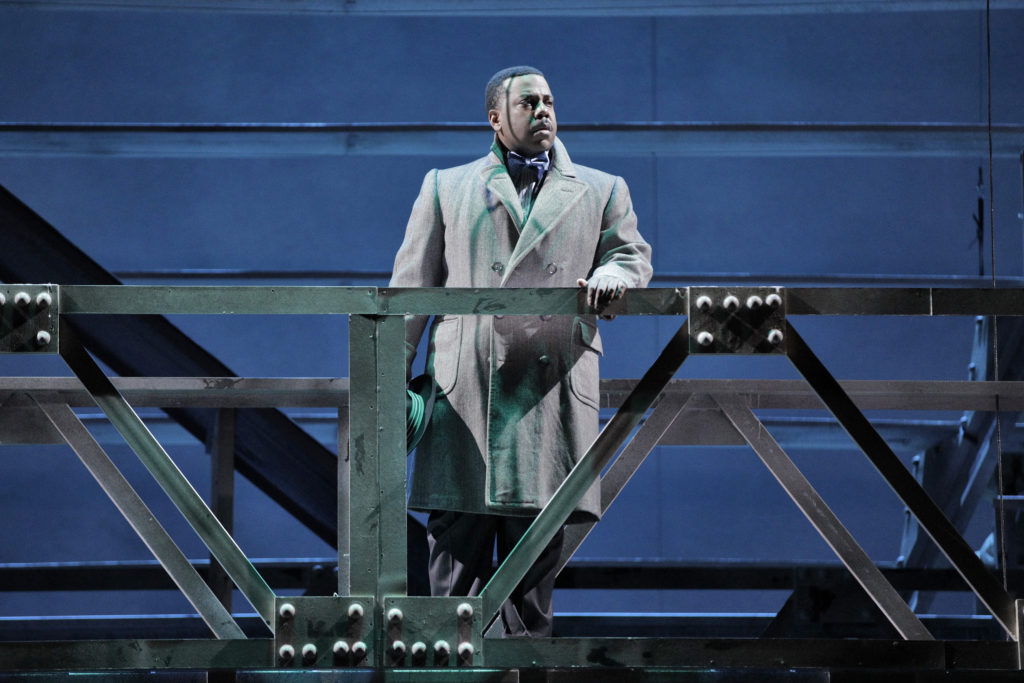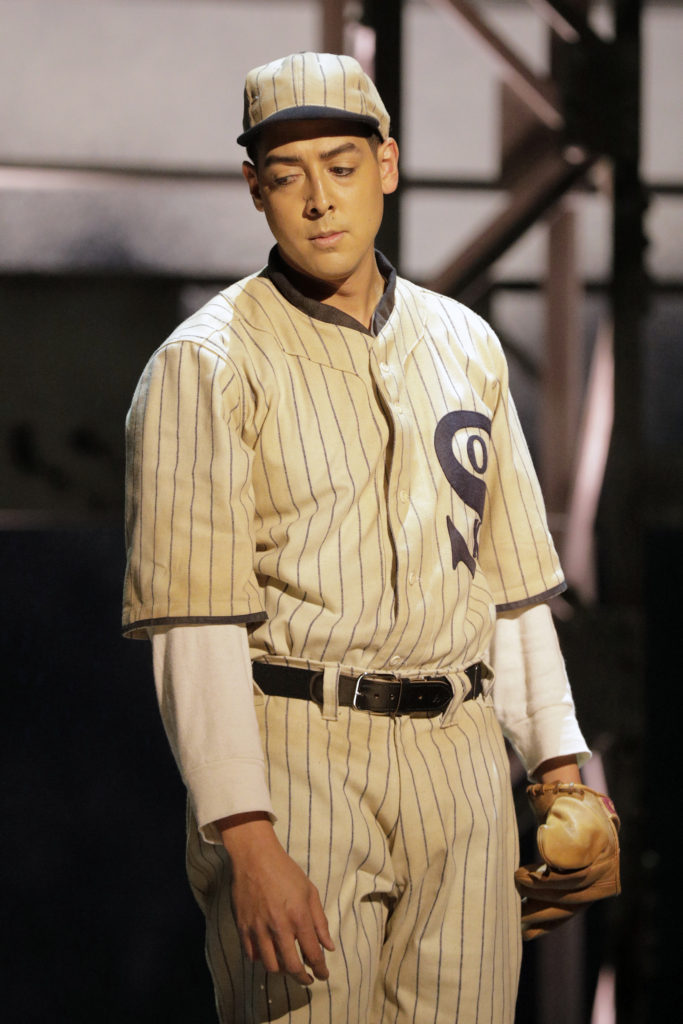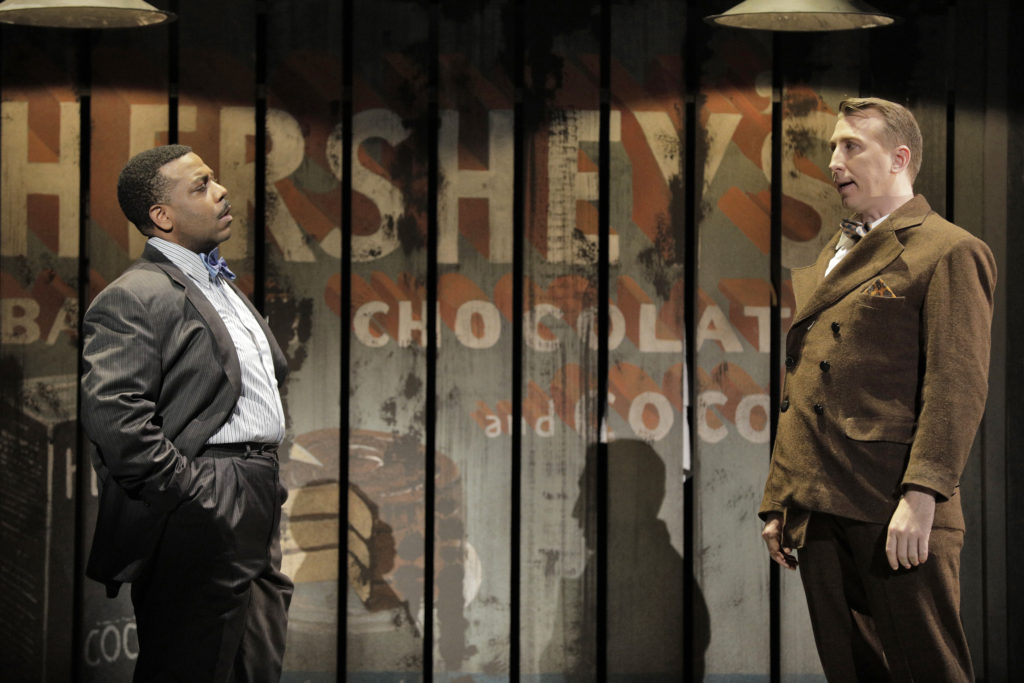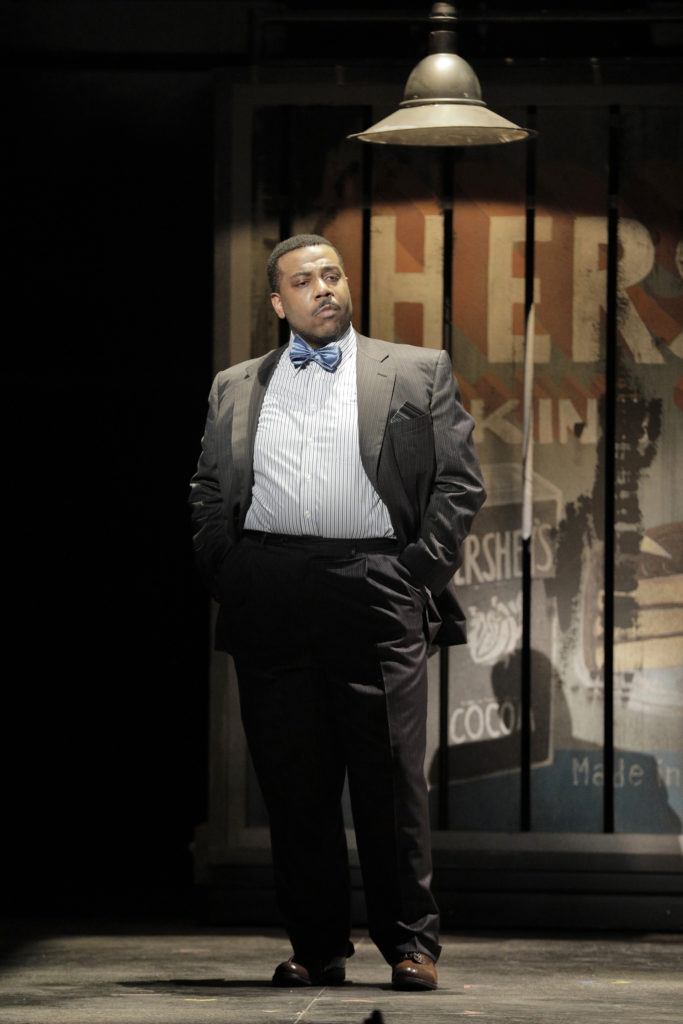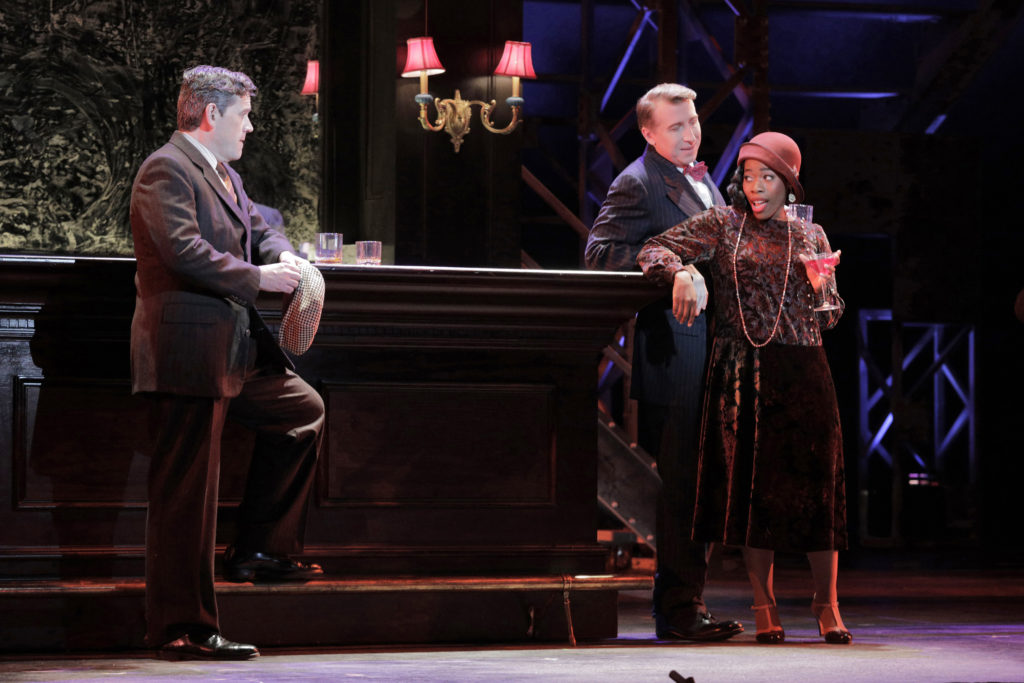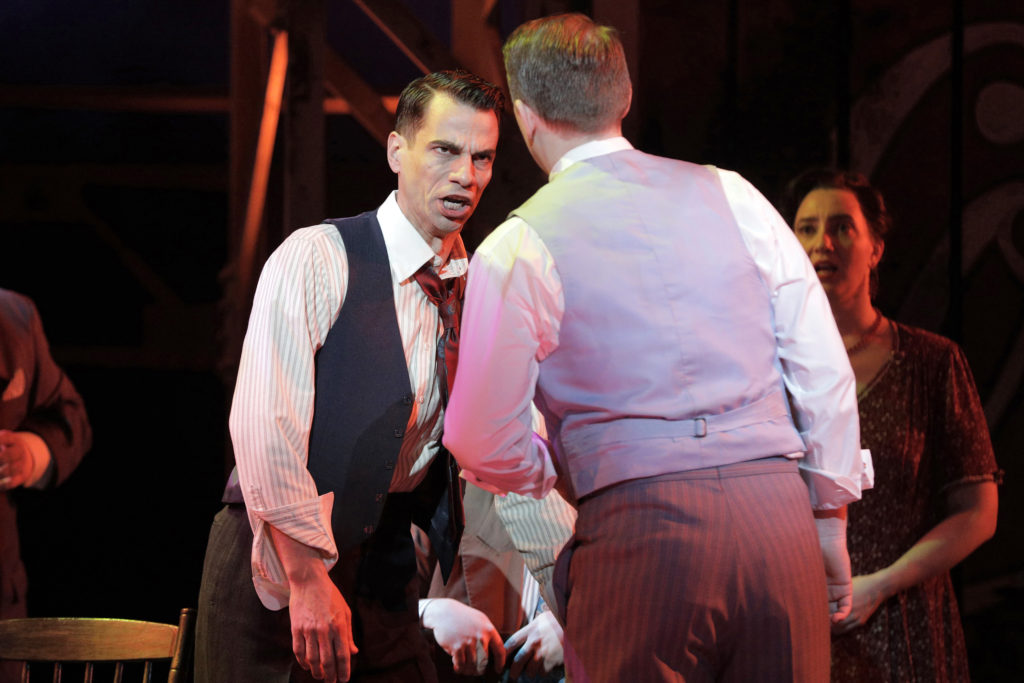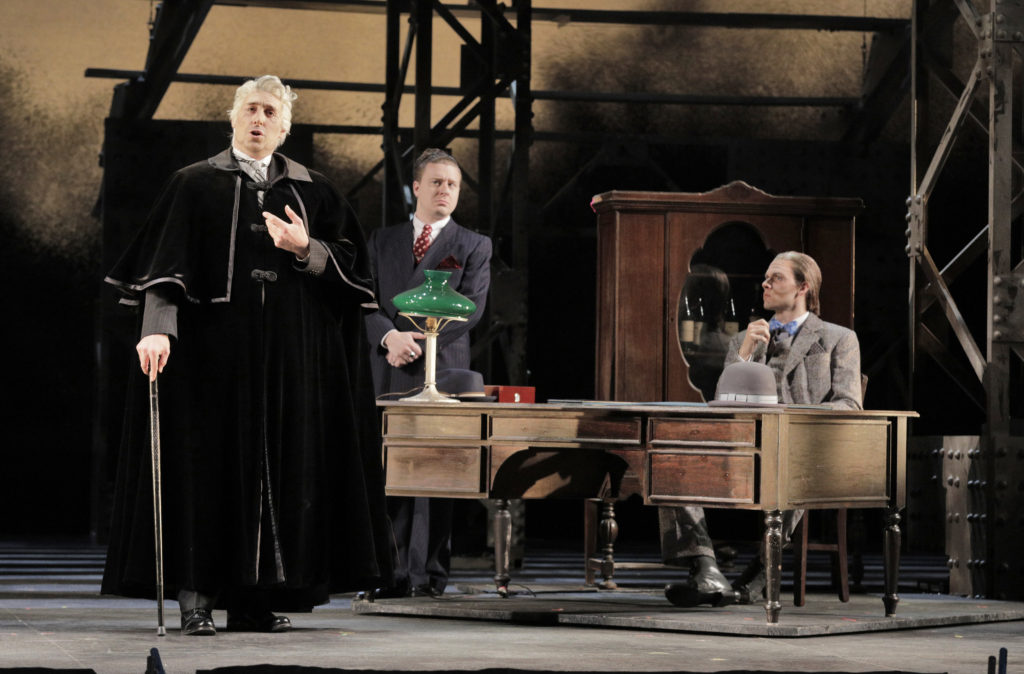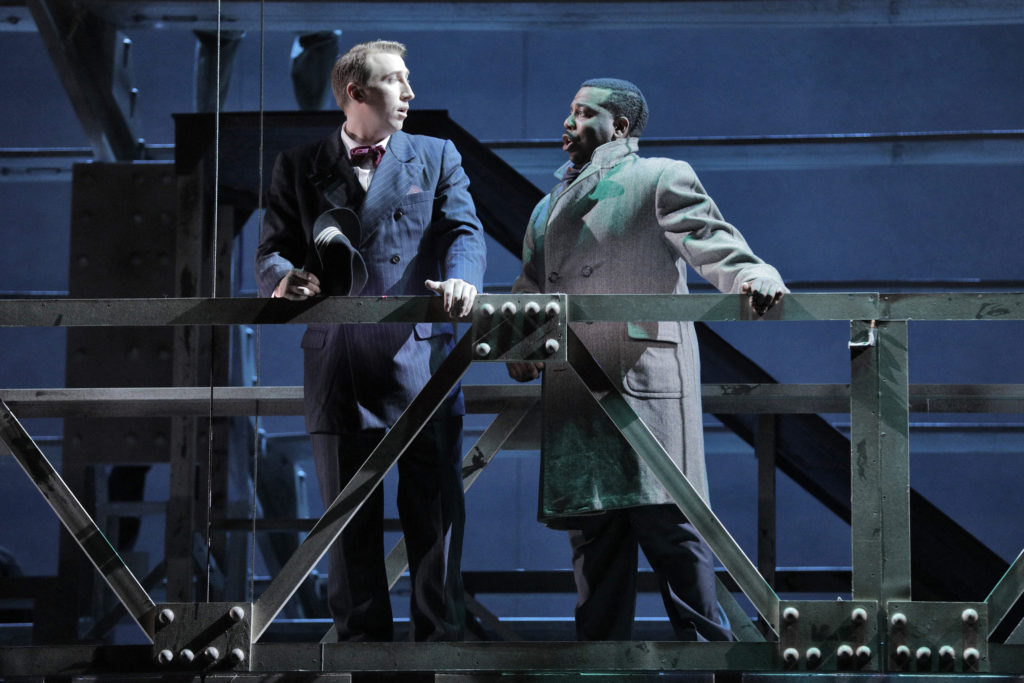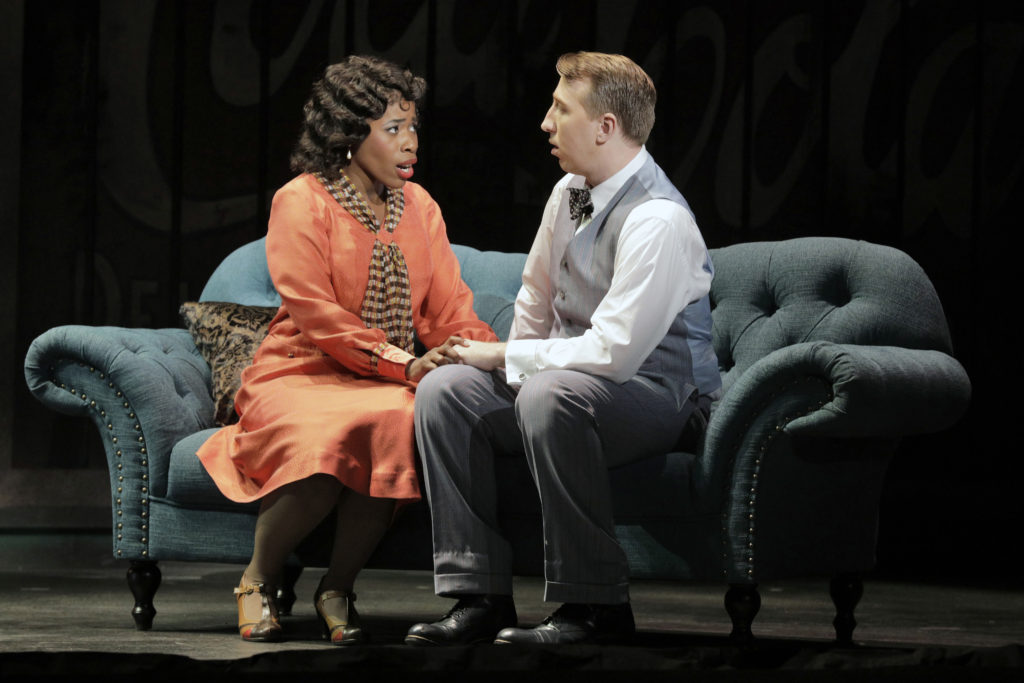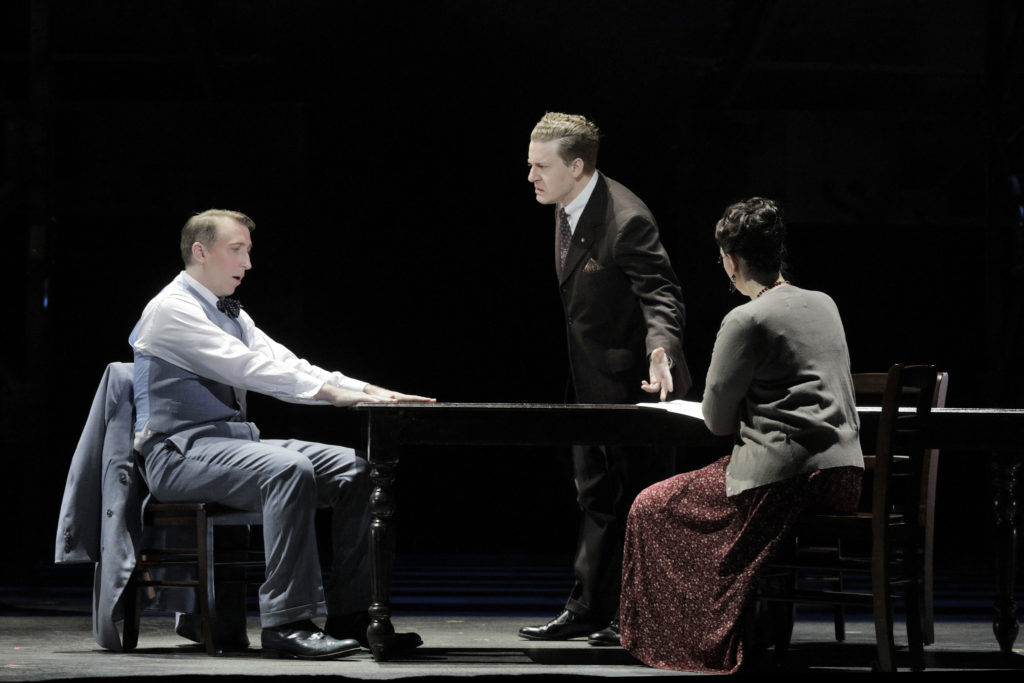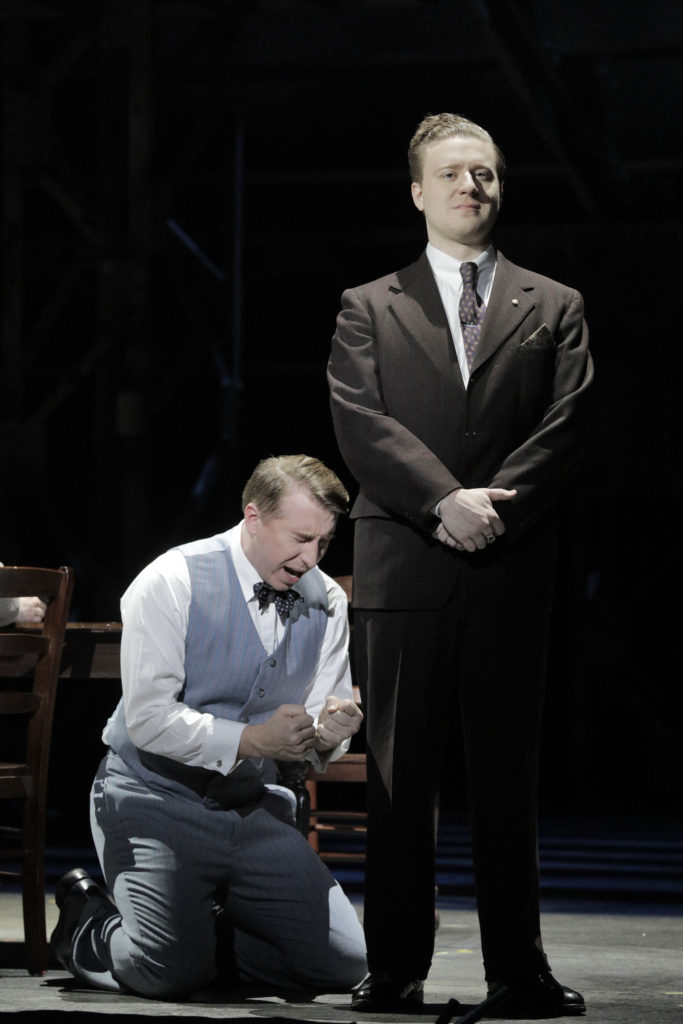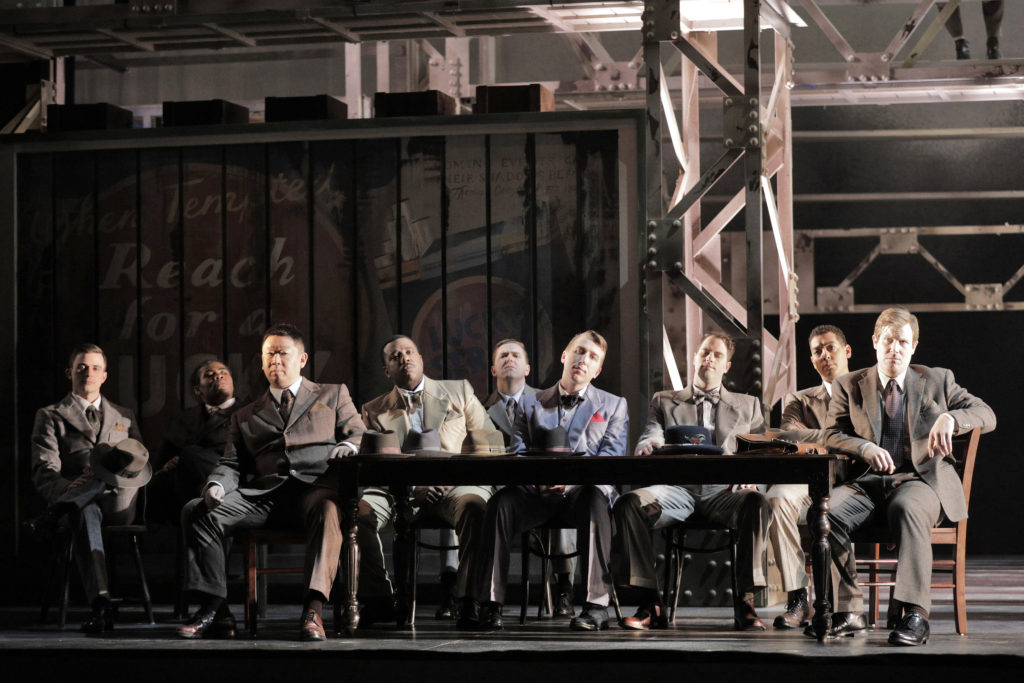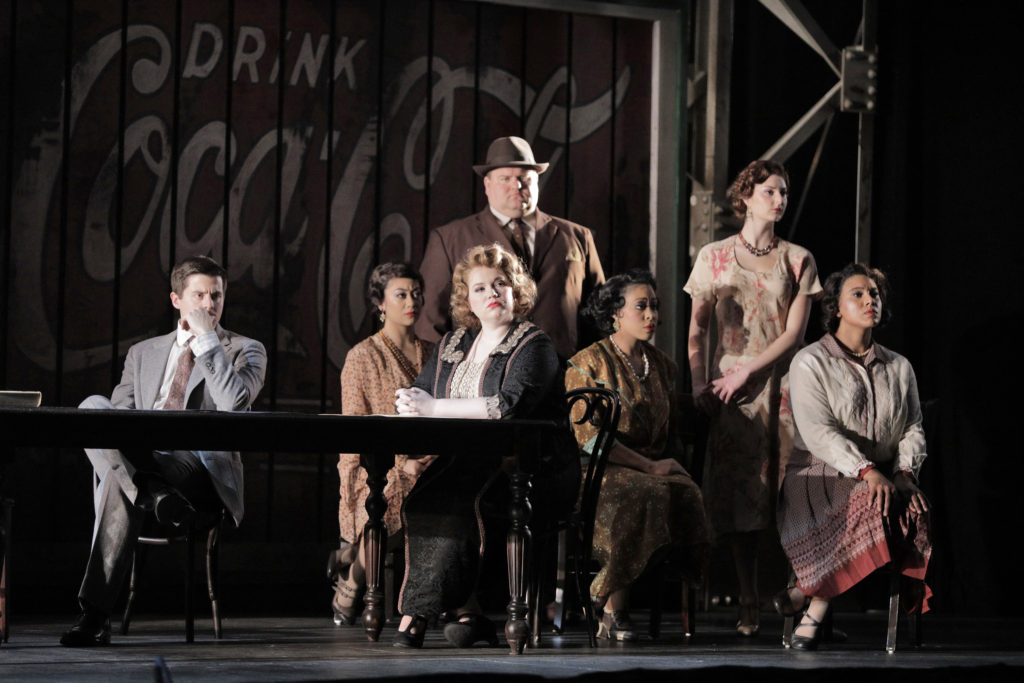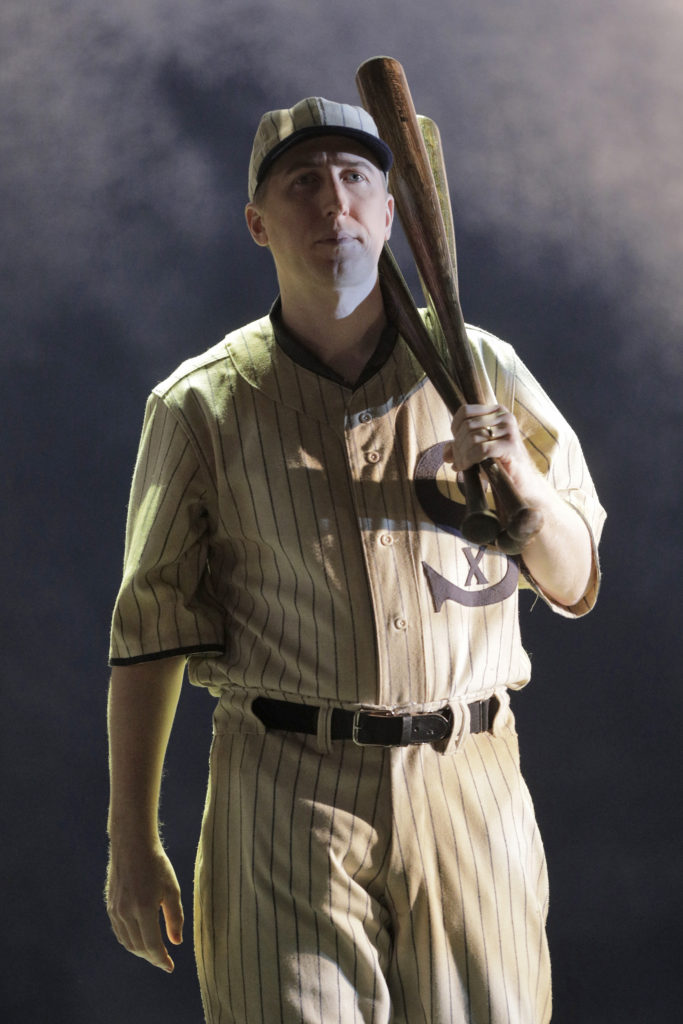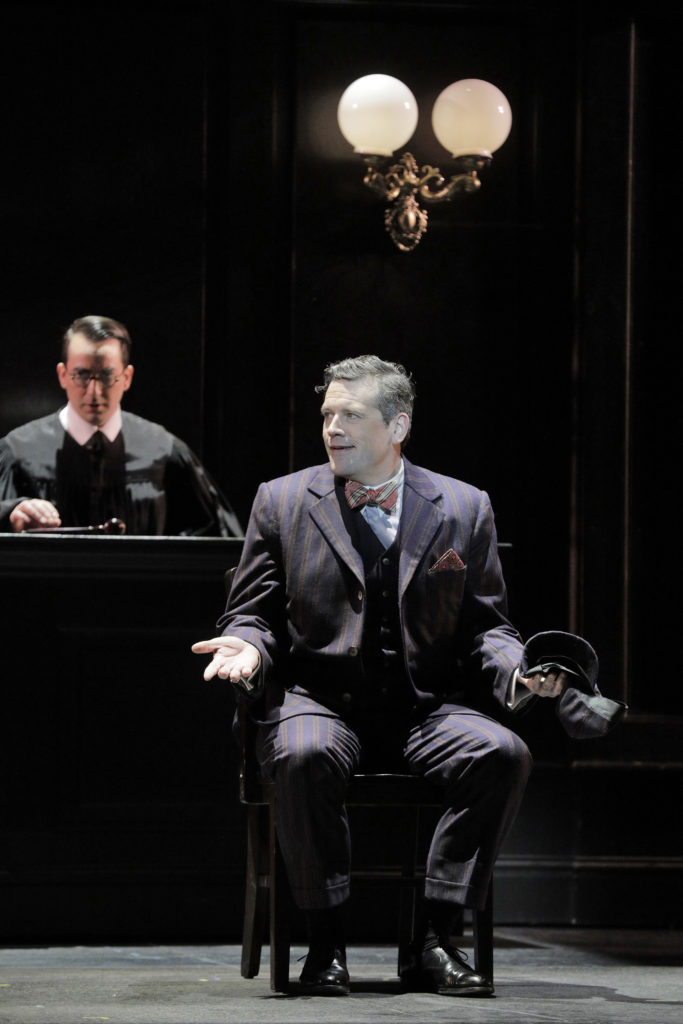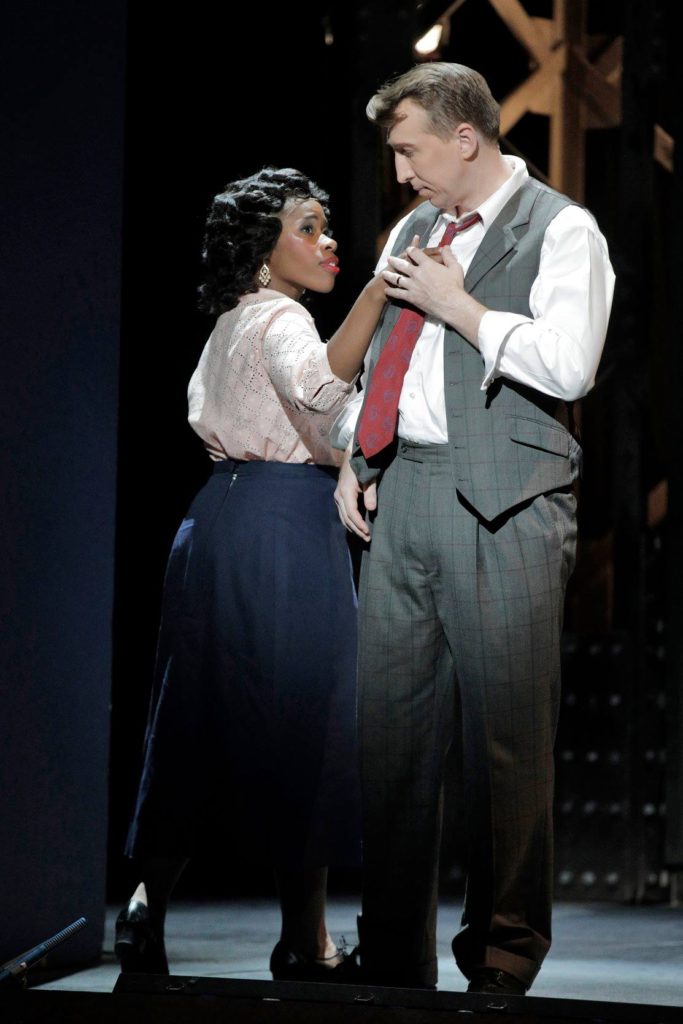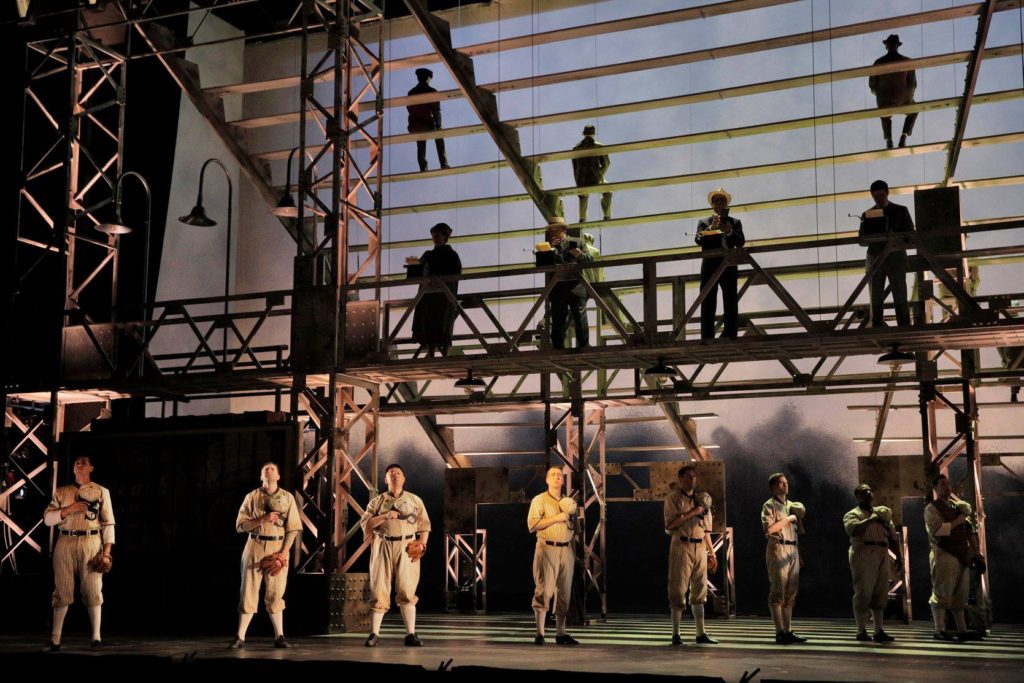“MN Opera’s exceptional world premiere “The Fix” deserves expanding to other cities or venues as this true story represents a microcosm of what can happen when management and players fail to respect each other– a poetic requiem for the American Dream.” —Broadway World
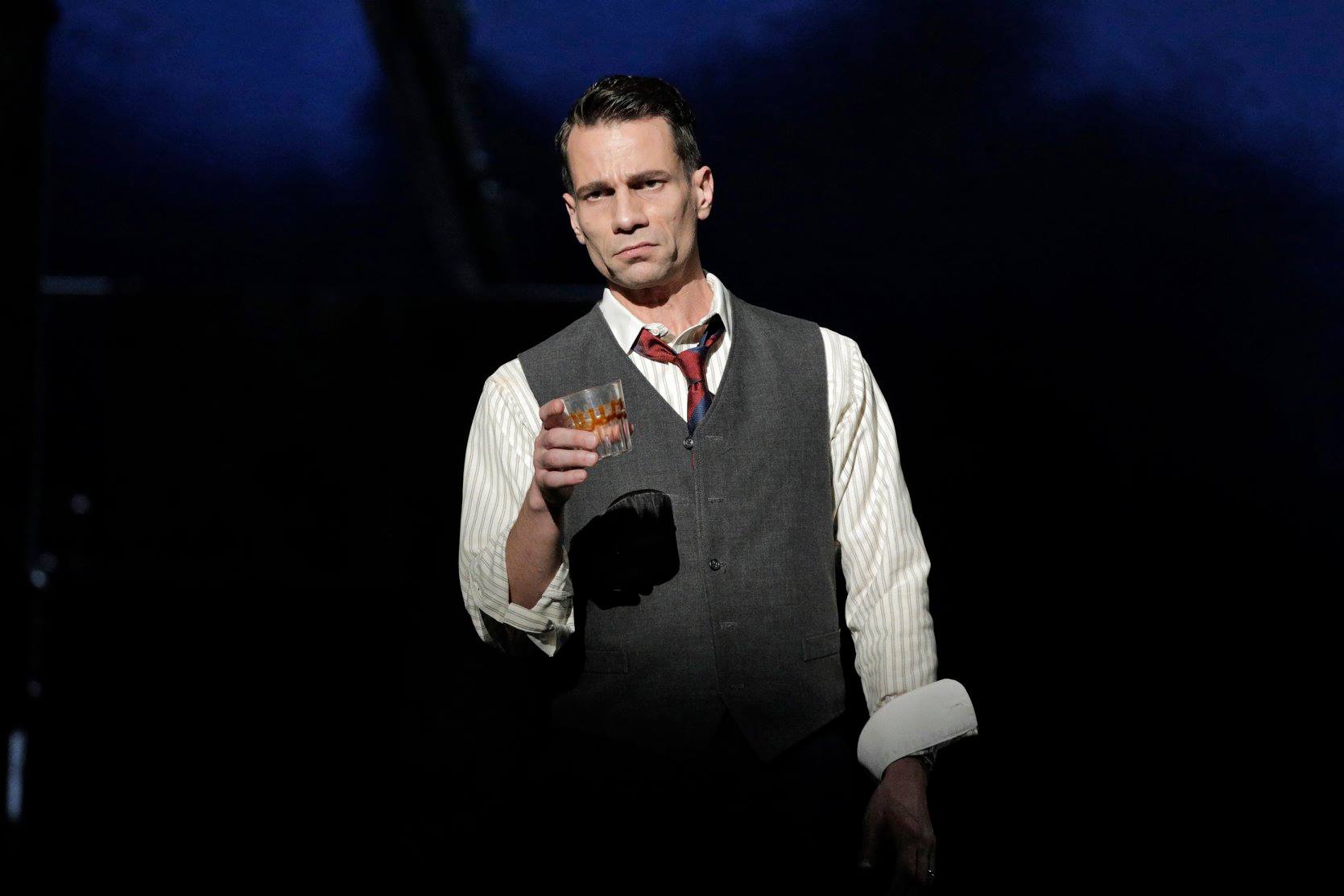
ABOUT
The Fix is an opera by composer Joel Puckett and librettist Eric Simonson. The work received its world premiere at the Ordway Theater, Saint Paul, Minnesota, on March 16, 2019 under the directorship and dramaturgy of Eric Simonson with a runtime of two hours and fifteen minutes with one intermission.
The Fix was commissioned by Minnesota Opera as part of its New Works Initiative with support from the National Endowment for the Arts.
Joel Puckett, Composer (learn more)
Eric Simonson, Librettist and Stage Direction (learn more)
Timothy Myers, Conductor (learn more)
Walt Spangler, Scenic Design (learn more)
Robert Wierzel, Lighting Design (learn more)
Trevor Bowen, Costume Design (learn more)
Heidi Spesard-Noble, Choreographer
2 flutes
2 oboes
2 clarinets in B-flat (2. doubling bass clarinet in B-flat)
2 bassoons
4 horns in F
3 trumpets in C
2 trombones,
bass trombone
timpani
3 percussion
piano doubling celesta
harp
strings
ACT I
“Shoeless” Joe Jackson, star slugger for the Chicago White Sox, is scolded by his wife, Katie, for signing a contract against his interests. She reminds him he is far too trusting of others.
Months later, the White Sox team looks forward to the World Series. Ring Lardner, optimistic reporter, extols the virtues of the “best team in the history of baseball” while his cynical counterpart, Hugh Fullerton, digs for dirt. Ace pitcher Lefty Williams pulls Joe aside and encourages him to consider a plan to “set things right” with cheapskate owner Charles Comiskey.
In New York, professional gambler “Sleepy” Bill Burns works with mobster Abe Attell to finance throwing the Series, while in Chicago eight players meet to discuss joining the conspiracy. Joe, the deciding vote, reluctantly agrees, and the fix is on.
Just before the first game, Ring and Hugh discuss rumors that the Sox will throw the Series. Ring refuses to believe it and waxes poetic about the virtues of “Shoeless” Joe. His spirits dampen when Sox ace pitcher, Eddie Cicotte, hits the first player up to bat.
Four games into the Series, the Sox are down three games to one. But Joe is having second thoughts. “It’s hard to play bad,” he tells Lefty. He convinces him that they and the others should, from now on, play to win.
At a Chicago bar, the Sox celebrate their second win in a row. Abe and Sleepy, nervous the Sox have gone against their word, threaten Joe with Katie’s life if the Sox don’t lose. Lefty, scheduled to pitch the next game, agrees to throw the game, and the Sox lose the Series.
ACT II
A year later, the Sox are, once again, headed for the World Series. But the mood is different. Rumors of a fix the previous year have cast a dark cloud over the team. Despite having the best season of his career, Joe is consumed with guilt. His co-conspirators insist he keep his mouth shut.
Comiskey and lawyer Alfred Austrian meet newly elected baseball commissioner Judge Kenesaw Mountain Landis, who vows to scrub gambling from the sport. Alone, the two chiefs predict the demise of their all-star team, but see an opportunity to replenish their roster with young and inexpensive sluggers.
At a bar, Joe runs into Ring. He shames Joe, who runs home to Katie and confesses. Katie persuades Joe to come clean to Austrian and the public, and the “Black Sox” scandal is blown wide open.
At a sensational trial, the eight accused players face the scorn of Comiskey and the press. The public, however, is on the players’ side, and when a not guilty verdict is delivered, most celebrate. Katie and Joe’s reprieve, though, is short-lived as Commissioner Landis declares the conspiring players banned from baseball for life, effectively ending their careers.
In an epilogue years later, Ray Schalk—now a baseball scout—runs into Ring, who has become an alcoholic and is suffering from tuberculosis. Ray tells him a story of running into Joe, now manager of a small dry goods store in South Carolina. In a flashback, we see Joe—run down and looking much older than his years—ashamed to recognize and acknowledge his former teammate.
Embracing the irony of the moment, Ring once again opines about the Joe that once was a boy from squalor, who made it big on nothing short of a dream.
| ||
The Chicago White Sox
| ||
baritone | ||
baritone | ||
tenor | ||
tenor | ||
baritone | ||
tenor | ||
baritone | ||
The Gamblers | ||
baritone | ||
baritone | ||
tenor | ||
The Civilians | ||
Katie Jackson | ||
baritone | ||
tenor | ||
Alfred Austrian, Esq. | bass | |
bass | ||
Sox, Gamblers, and Civilians | ||
(Click the box for full screen)
PRESS
MARCH 18, 2019
What I got was a delicately wrought, gorgeously orchestrated, beautifully sung paean to a lost American dream.
The Fix is about the White Sox throwing the 1919 World Series and facing the music. It towers above other premier commissions here (one a year), many based on movies, that adhere to the parlando conventions of 21st century American opera, shy of long melodic lines, duets and trios, and standout vocal writing.
The Fix fixed all that.
Puckett should be a household word. He uses a fresh idiom inflected with a southern twang especially appropriate to the story of Shoeless Joe Jackson. He employs his large orchestra to create a kaleidoscope of delicate sonorities as well as grand orchestral gestures.
The rhythms shift subtly with a certain relentless ticking and chiming that drives the tale forward. The music serves the libretto, often to a fault, and Puckett is unafraid of a swelling melody, the meat and potatoes of the standard repertoire.
Ring Lardner’s aria, “I love this team, Hugh,” is an anthem to the dream of human perfection even in so unlikely a candidate as the illiterate “country bumpkin,” Jackson. It is a standout moment movingly sung by Kelly Markgraf. It’s why we bother to go to the opera at all, and so rarely get in the landscape of new compositions that leave melody to Broadway.
Special kudos to Minnesota Opera for using a multicultural mix for the eight white White Sox players and for casting an African-American woman as Joe’s wife. It’s good to keep us on our toes and remind us how things have and haven’t changed.
The opera is a magnificent gift to the entire ensemble, offering a wide range of musically distinct character parts. To these ears, the standouts were Wei Wu as Chick Gandil, Margraf as Ring Lardner, and Joshua Dennis (the Duke of Mantua here last season, and Roméo before that) as Shoeless Joe. They sang so cleanly that I rarely had to look at the supertitles.
Judging from what I saw, Joel Puckett and Minnesota Opera hit it out of the park.
JUNE 2019
Puckett’s score is full of orchestral riches, with a shimmering prelude, fascinating use of bells, celeste and marimba, and triumphal passages reminiscent of Aaron Copland.
An ambitious, fast-paced drama
March 18, 2019
Central to Eric Simonson’s concise libretto is the character of “Shoeless Joe” Jackson, who set batting records for the White Sox and was one of eight players permanently banned from baseball in the wake of the scandal. Jackson’s precise role has always been disputed. “The Fix” depicts him as a heavily conflicted character, uneasily caught up in criminal events.
Puckett’s music cast something of a halo around Shoeless Joe as he wrestled with the moral complexities of his situation. Tenor Joshua Dennis looked the part as the conflicted slugger, singing ardently in the soaringly lyrical music Puckett gave him for moments of introspection.
If ultimately “The Fix” veered somewhat precariously between entertainment and social analysis, it did raise serious questions about the role power and money continue to play in professional sports.
For that, and for Puckett’s playful, eerily suggestive music, “The Fix” is definitely worth seeing.
March 19, 2019
The Fix holds an engrossing, 2lst-century sonic mirror to a society questioning its identity and core values through the condemnation of a social innocent who disappoints his fans who worship what he represents to them. Decide for yourself whether Joe and his cohort’s punishments are deserved when a performance of The Fix comes to an opera house near you.
Conductor Timothy Myers gives full, emotional expression to Puckett’s moody, ironic score while Walt Spangler’s scenic design, particularly the jungle-gym grandstand arching over the shadowy activity underneath, contributes to the production’s fatalistic tone.
March 20, 2019
Perhaps The Fix underscores a belated requiem for Shoeless Joe—because his heavier than normal, tobacco stained bat named Black Beauty, entered into the Baseball’s Hall of Fame for a time, while he, the player, remained banned for life. On opening night, a father and his twelve year old son shared these moments together, and then discussed the future of gambling and sports, and the how the opera opened up these discussions. The young man sat enthralled for the entire tow act opera, and left with a smile after the crowd rose for a standing ovation.
MN Opera’s exceptional world premiere “The Fix” deserves expanding to other cities or venues as this true story represents a microcosm of what can happen when management and players fail to respect each other– a poetic requiem for the American Dream of living out a person’s passion and talent free from corruption, misanthropy and racism in a country, as the fans and players sing in the opera, also calledl the “Land of the Free” and the “Home of the Brave.”
March 20, 2019
I have had mixed responses to the output of Minnesota Opera’s New Works Initiative, from the glorious Silent Night to the scabrous The Shining. The Fix rises to the top tier of these works, as it delivers a musical gift to opera lovers, locally, and—if there is justice—across the nation. To put it in the simplest terms, it is a grand-slam.
Eric Simonson’s libretto provides the narrative in a forthright manner, maintaining the authentic voices of each character. Simonson also serves as stage director, maintaining a strong focus on the compelling enactment of this story. Conductor Timothy Meyer leads the Minnesota Opera Orchestra in giving a breathless reading of the score, attesting to the majesty of this newly hewed work.
Puckett’s music draws from a range of idioms that reflect the era, with a baseline of sweeping pastoralism that establishes the grandeur of the game and the upheaval of the fix in the context of our national landscape, and brings in strains of ragtime and vintage popular music. … He provides taut musical themes that create suspense and tension in sequences that might have been only expository, given that their outcome is a matter of historical record.
Puckett provides a soaring musical theme for Joe and Katie to pledge their love to one another, beautifully sung by (Joshua) Dennis and (Jamine) Habersham.
March 22, 2019
Composer Joel Puckett’s music is evocative in its mix of the transcendental and the forlorn. Ghostly shades of Bernard Herrmann, Ralph Vaughan Williams, and Claude Debussy are spirited beautifully through an orchestra conducted by Timothy Myers. This is one of those operas where you can just bathe in the waves of the music.
Librettist Eric Simonson wrestles with problems of how we idealize those who are imperfect and how guilt eats the soul. This manifests in the character of journalist, Ring Lardner. A magnificent Kelly Markgraf infuses his splendid lyrics with spiritual yearnings for men to approach the divine as they integrate their body and psyche. The athlete emanates such an archetype in Lardner’s mind’s eye. He echoes Hamlet’s phrase “What a piece of work is man!”—said not in the ironically disparaging way it often is today, but in supplicating exaltation.
March 24, 2019
Puckett has a really broad base of influence that has amalgamated into a really unique voice, which is very exciting for a composer that is writing his first opera. To be so developed in his craft and secure in his own voice – to articulate all of this as strongly as he does. And so, one will hear a lot of music to which one can immediately relate. For example, Americana style and Jazz-based style of lush orchestration: there are parts that just lift off to the Heavens. It really is incredible.
Even during the seedy scenes that portray deals-going-down at the back room of a club, there is sort of this incredibly rhythmic vibe oriented in a jazz structure. The way that Puckett blends all of the musical voices together to work as one voice is quite remarkable.
(picked up by more than one hundred media outlets including The New York Times, ABC News, CBS News, Chicago Tribune, ESPN, Fox Sports, and The Washington Post)
March 15, 2019
Joel Puckett was in the stands at Atlanta-Fulton County Stadium on July 4, 1985, for the famous rain-delayed 19-inning game that ended with the New York Mets beating the Braves at 3:53 a.m. followed by postgame fireworks.
“I had a long history of pulling for terrible teams,” he saidPuckett’s contribution to baseball won’t stretch for nearly as long. He composed “The Fix” to mark the 100th anniversary of the Chicago Black Sox agreeing to throw the 1919 World Series, a work that premieres Saturday at the Minnesota Opera in St. Paul. The two acts run 2 hours, 15 minutes, including an intermission.
With a libretto by Eric Simonson, the opera has a cast that includes tenor Joshua Dennis as Shoeless Joe Jackson, the famous Chicago outfielder, and baritone Kelly Markgraf as Ring Lardner, the renowned writer.
“He’s just he’s just a wholly different character than I’ve ever done,” Dennis said. “Especially as an opera singer who sings a lot of very proper languages, diving into his linguistics and that kind of — I don’t want to say backwards — but that kind of uneducated Appalachian linguistics, it’s been a really interesting study for me.”
The Minnesota Opera has been a leading force for new music, presenting premieres that include “The Grapes of Wrath” (2007) by Ricky Ian Gordon and Michael Korie; “Silent Night” (2011) and “The Manchurian Candidate” (2015) by Kevin Puts and Mark Campbell; “Doubt” (2013) by Douglas J. Cuomo and John Patrick Shanley; “The Shining” (2016) by Paul Moravec and Campbell (2016); and “Dinner at Eight” by William Bolcom and Campbell (2017).
Dale Johnson, the Minnesota Opera’s artistic director, decided Puckett would pair well with Simonson, who grew up a Milwaukee Brewers fan. They even share the same birthday, June 27, when Puckett turns 42 and Simsonson 59.
Simonson wrote “Lombardi,” which had an eight-month Broadway run in 2010-11, and also “Magic/Bird” in 2012 and “Bronx Bombers” in 2014, which both lasted less than two months.
He was familiar with “Eight Men Out,” both Eliot Asinof’s 1963 book and John Sayles’ 1988 film. Jackson and the other seven White Sox players who accepted money from gamblers to lose the 1919 World Series against Cincinnati were acquitted at a criminal trial in August 1921 but were banned from the sport for life the following day by Kenesaw Mountain Landis, the first baseball commissioner.
Even though Jackson accepted a $5,000 bribe, he hit .375 in the Series with six RBIs in six games. Jackson had a $6,000 salary from White Sox owner Charles Comiskey, a pay structure that prompts teammate and fellow conspirator Chick Gandil to sing: “Here’s your headline: ‘Skinflint Comiskey gets pennant at rock bottom prices.’”
Operas about sports are rare but not unprecedented. Daniel Sonenberg’s “The Summer King” about Negro Leagues star Josh Gibson, premiered at the Pittsburgh Opera in April 2017 after more than a decade of development.
Puckett spent three years working on his first opera, and he has a distinctly American sound with echoes of Aaron Copland and Charles Ives. He enjoyed composing “sort of nefarious, dark” music for the gambler characters Arnold Rothstein, Bill “Sleepy” Burns and Abe Attell.
“That kind of New York 1920,” he said.
Simonson views this as a great tragedy and wants the audience to come away with the same feeling they might when leaving Shakespeare’s “Hamlet,” ″King Lear” or “Macbeth.”
“Our heroes are celebrities that come from anywhere,” he said. “They’re not kings. They might be somebody like Shoeless Joe Jackson. And what I want them to feel is that we’re susceptible to the same human frailties that Joe Jackson is. It’s in a sense a cautionary tale: make the right decision. If somebody comes up to you and wants to ask you to conspire against the public to lose the World Series, don’t do it.”
March 15, 2019
Simonson describes “The Fix” as an “uplifting tragedy.” It sounds like an oxymoron. But if the opera pulls off that balancing act, the hope is that audiences will understand the tragedy of Shoeless Joe Jackson, who made mistakes that tarnished the game of baseball. Simonson also hopes audiences leave with renewed appreciation for the enduring beauty of America’s pastime.
March 14, 2019
Naturally, all parties concerned hope that “The Fix” will have legs, as they say on Broadway — that it will be taken up by other companies. There remains another factor that is perhaps too dangerous to mention, too enticing, too magical.
Consider: Puckett’s longtime friend and colleague at the Peabody Conservatory is Kevin Puts, whose opera “Silent Night,” a Minnesota Opera commission, received the Pulitzer Prize for Music in 2012. It was a first opera for Puts, as “The Fix” is for Puckett. It, too, was directed by Eric Simonson.
Is it possible that lightning could strike the same spot twice? Could Minnesota Opera hit two home runs in less than a decade?
March 13, 2019
“The Fix” sprang from the mind of composer Joel Puckett. “It’s my fault,” he admitted.
He’s a baseball fan steeped in Black Sox lore. As a boy in the 1980s, he went to a lot of baseball games with his dad.
“That was when Pete Rose was found to have bet on baseball,” he said. “So that brought back up the story of the Black Sox.”
When the Minnesota Opera asked him about writing an opera, he immediately thought of the Black Sox scandal. It was not just because of the story of Shoeless Joe. In 1919, pro baseball was just becoming a big moneymaker for the owners, and the players weren’t getting a share.
“I thought, ‘What’s more operatic than a story of a bunch of over-talented under-educated being taken advantage of by the over-privileged uber-wealthy?'” he said.
MEDIA
PRODUCTION PHOTOS
